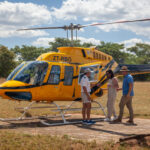Bush Bulletin – September 2024
Winter is coming to an end in the bush and spring is upon us. It’s an exciting time of the year as we see the bush form new life. From wild flowers to baby impalas, the bush is blooming.
THE AFRICAN FISH EAGLE BY JOHAN
One of the most amazing eagles we get to see on safari is the African Fish Eagle – it is a fairly large eagle. It has a distinctive black, brown, and white plumage. Although, as its name suggests, it feeds extensively on fish, in some areas it preys on flamingos and other water birds. It is also known to eat carrion and is classified as a kleptoparasite. (It steals prey from other birds.) Goliath Herons are known to lose a percentage of their catch to Fish Eagles. Their main diet is fish, sometimes dead, but mostly caught live. Catfish and lungfish are caught most frequently. Larger prey are eaten on the ground next to the water.
They have two distinct calls. In flight or perched, the sound is something like the American Bald Eagle. When near the nest its call is more of a ‘quock’ sound – the female is a little shriller and less mellow than the male. So well-known and clear is the call of this bird that it is often known as ‘the voice of Africa’.
African Fish Eagles are usually seen in pairs inside and outside the breeding season, even sharing kills made by either of them. They spend more time perched than flying, and usually settle for the day by 10 am, having made their kill, although they will kill at any time of the day. They are most frequently seen sitting high in a tall tree from where they have a good view of a stretch of river, lakeshore or coastline, which constitute their territory. Near a lake with an abundant food supply, a pair may require less than a square mile of water to find enough food, whereas next to a small river, they may require a stretch of 15 miles or more. Some tend to move around to avoid the wettest weather, whereas others stay where they are all year round.
The African fish eagles is related to the American Bald Eagle of North America. They are from the same genus, Haliaeetus, also known as sea eagles which is one of the most ancient genera of the raptors found on Earth today.
SAVE RHINOS, SAVE PEOPLE, SAVE TOMORROW BY STUART
For the past 10 years I have followed Care for Wild on various social media platforms. It’s a mix of emotions, as you see some heartwarming stories, but unfortunately, you also see the tough side of it all. Visiting was always a dream of mine, but the chances were slim, as they only allow a handful of visitors each year.
So, you can imagine my excitement when a guest asked if I wanted to join them on a day out to Care for Wild. Butterflies and excitement took over as we turned the corner and saw a helicopter waiting for us. A quick but thrilling helicopter ride brought us to Care for Wild. As we came in to land, you might be lucky enough to see a few rhinos, but I never could have imagined what came next.
We were taken to the orphanage in an old-school Land Cruiser. Welcoming us were the friendly faces of the Care for Wild team. They gave us a quick rundown, and we were off. First, they explained the food, diets, and ages of the different rhinos in the orphanage. But I had no idea what was coming next. I had followed Daisy’s story on Instagram but had no idea we would be meeting her. It felt like we were meeting royalty—of the rhino kind. We were shown around and heard her story, but the fun was about to start. We were lucky enough to feed her two bottles of specially created milk. But remember, this isn’t a 100-kilogram animal—more like a 1.5-ton animal, so the word “gentle” doesn’t apply. She’s cute, but my goodness, she doesn’t mess around. A 2-litre bottle disappears in just over a minute.
After that, we were taken to the slightly older rhinos, where we could feed them some pellets while the staff explained their situations and futures. It’s important to understand that all these rhinos have an incredibly bright future, as the plan is to reintroduce them back into the wild. A presentation followed where the team explained the future plans of the orphanage and the rhinos, but they also talked about the harsh reality of rhino poaching. Videos were shown, and tears rolled down my cheeks—it’s tough to watch but very important to understand.
It was such a privilege to be given the opportunity to visit such an amazing and breathtaking organisation. If you have any questions or want to add this experience to your booking, please speak to the ladies at reception at Leopard Hills.
ON THE PERCH BY MICHAEL
Vultures are often frowned upon as they are scavengers and are considered a ‘dirty bird’. They survive by feeding on the remains of animals and don’t appear as the most beautiful creatures! Although they are stereotyped as “dirty” and “gross”, they actually spend a lot of time bathing and preening their feathers!
There are 23 species of vulture in the world, 9 of which are in South Africa. In the Sabi Sand Game Reserve our most common species consists of the White-backed vulture as well as the Hooded vulture. They don’t only spend a lot of time being our natural vacuum cleaners, but also help us tremendously find other carnivorous animals such as wild dogs!
A great example of this happened not too long ago… We were desperately on the search for the African wild dogs and had spent the better half of our morning drive tracking them. Finally, Jo (one of our guides) came across something that would lead us straight to the dogs. He found vultures on the perch waiting for the dogs to finish the last bite of their meal. Johan went in to investigate and found a pack of 7 adults and 10 puppies! Most of the time the bush has a way of showing you exactly what you want, you just have to read the signs…
YOUR DREAM SAFARI
If you’re interested in experiencing an awe-inspiring South African safari, please don’t hesitate to get in touch with our reservations desk at book@leopardhills.com.
Alternatively, click here and make use of the quick and seamless online booking process and start planning your ideal vacation today.
We look forward to welcoming you to Leopard Hills Private Game Reserve!





